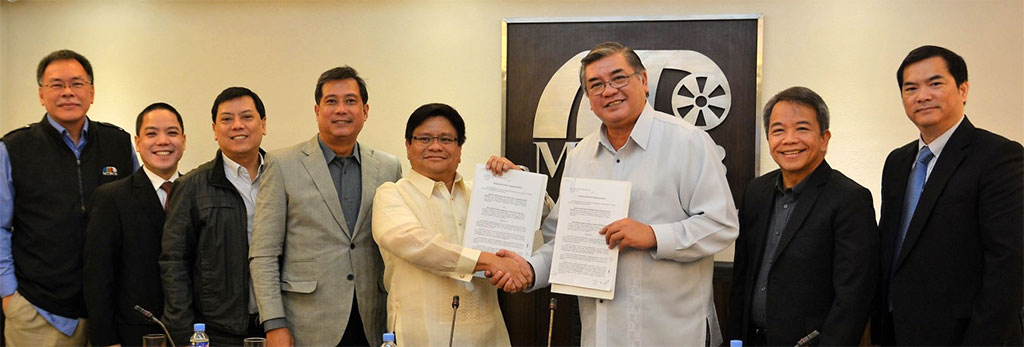
Salomon, Jr. and Atty. Jose Antonio K. Veloso, and MTRCB Chairperson Eugenio H. Villareal; PDRCI President
Mr. Gregorio S. Navarro, PDRCI Secretary General Atty. Roberto N. Dio, and PDRCI Trustee Atty. Charlie Ho.
After more than a year of planning and discussions, the Philippine Dispute Resolution Center signed on November 17, 2016 a Memorandum of Understanding (MOU) with the Movie and Television Review and Classification Board (MTRCB) at its office in Quezon City. Fittingly, the signing ceremony took place at the Adjudication Room of the MTRCB, where disputes were heard or resolved by the Board.
Under the MOU, PDRCI and MTRCB shall collaborate to:
• design, recommend and implement an alternative dispute resolution (ADR) framework for the entertainment industry in order to provide stakeholders with a mechanism to resolve their disputes in a speedy, cost-effective and private manner; and
• collaborate on and support any and all activities highlighting the benefits of ADR aimed at promoting amicable resolution of disputes, including but not limited to conducting seminars, lectures, road shows and other information dissemination, training, and capacity-building activities.
In his remarks before the signing, MTRCB Chair Eugenio H. Villareal expressed his wish that the ADR framework would be kept simple, citing the adage in writing “Keep it Short and Simple” (KISS), and that it should fit the needs of the parties “like water acquiring the shape of the bottle.” He said that engaging in ADR is the much better approach in dispute adjudication.
Chair Villareal added that MTRCB should continue to engage in “best practices” conferences, a form of ADR similar to mediation that the office evolved, where the parties were encouraged to suggest remedial measures in case of disputes or violations of MTRCB regulations. Finally, the MTRCB Chair invited PDRC to partner with MTRCB in the “Matalinong Panonood” (Intelligent Viewing) program.
In his brief response, PDRC President Gregorio S. Navarro gave a short history of the center from its early days as the Arbitration Committee of the Philippine Chamber of Commerce and Industry and how PDRC evolved into the leading arbitration center in the Philippines, with cooperation agreements with several leading regional and international arbitration centers.
Mr. Navarro also spoke on PDRC’s role in the enactment of the ADR Act of 2004 and its implementing rules and regulations. He narrated his own experience with KISS, as defined by a lawyer.
The MOU was initiated by PDRC Trustee Atty. Charlie Ho and MTRCB Board Member Atty. Jose Antonio K. Veloso, who started the ADR program in the MTRCB. They will collaborate in preparing the ADR framework for the entertainment industry.
Waiver of Appeal: Testing the limits of party autonomy under Philippine law
PART ONE
 Parties who enter into arbitration agreements generally expect arbitral awards to be final, particularly in jurisdictions that have adopted the UNCITRAL Model Law. There is a natural expectation on the part of either party that the arbitral award may only be challenged on very limited grounds affecting due process or public policy, such as partiality of the arbitral tribunal or the invalidity or breach of the arbitration agreement [UNCITRAL Model Law, Art. 34, 36; see Francesca Richmond, When is an arbitral award final? available at http:// kluwerarbitrationblog.com/2009/09/10/when-is-an-arbitralaward-final/, last accessed 1 May 2016 ; see also Dean v. Sullivan, 118 F.3d 1170, 1171, 7th Cir. (1997)].
Parties who enter into arbitration agreements generally expect arbitral awards to be final, particularly in jurisdictions that have adopted the UNCITRAL Model Law. There is a natural expectation on the part of either party that the arbitral award may only be challenged on very limited grounds affecting due process or public policy, such as partiality of the arbitral tribunal or the invalidity or breach of the arbitration agreement [UNCITRAL Model Law, Art. 34, 36; see Francesca Richmond, When is an arbitral award final? available at http:// kluwerarbitrationblog.com/2009/09/10/when-is-an-arbitralaward-final/, last accessed 1 May 2016 ; see also Dean v. Sullivan, 118 F.3d 1170, 1171, 7th Cir. (1997)].
As early as 1921, the Philippine Supreme Court recognized that arbitration is a means to achieve a “final disposition, in a speedy and inexpensive way, of the matters involved [in a dispute], so that they may not become the subject of future litigation between the parties” (Chan Linte vs. Law Union and Rock Insurance Co., et al., G.R. No. L-16398, December 14, 1921).
With the enactment of the Alternative Dispute Resolution Act of 2004, or the “ADR Act,” the Philippines adopted the 1985 version of the Model Law with respect to international commercial arbitration and of some aspects of domestic arbitration. Under the law, decisions of arbitral tribunals are generally not appealable, and may not be challenged, on the merits (i.e., on questions of law or facts).
Only in the very limited instances provided by law may a regular court reverse, set aside or refuse recognition of an arbitral award. In a jurisdiction where appeals can take decades to resolve, limiting the ability of a losing party to challenge an arbitral award before a Philippine court was most certainly a welcome development.
Nevertheless, it may be said that there continues to be some chinks in the armor of Philippine arbitration law. A number of Philippine legislations allow merits appeal of certain arbitral awards. One example is in the area of construction disputes.
The Philippine Supreme Court has ruled that despite the enactment of the ADR Act, arbitral awards under the rules of the Construction Industry Arbitration Commission (CIAC) in construction disputes “may be appealed to the [Court of Appeals] x x x [s]uch review of the CIAC award may involve either questions of fact, of law or of fact and law” (J Plus Asia Development Corporation v. Utility Assurance Corporation, G.R. No. 199650, June 26, 2013; see also CIAC Arbitration Rules, Rule 18, § 18.2).
Procurement contracts with the Philippine government is another such area. Arbitral awards relating to contracts involving government procurement may also be appealed on questions of law. Under § 60 of the Government Procurement Reform Act, disputes may be submitted to arbitration and the arbitral award shall be appealable to the Court of Appeals on questions of law.
Notably, appeal of arbitral awards on the merits, while arguably not the norm, is recognized in other jurisdictions. Certain countries allow appeals of arbitral awards on questions of law. Under § 69 of the English Arbitration Act of 1996, “[u]nless otherwise agreed by the parties, a party to arbitral proceedings may… appeal to the court on a question of law arising out of an award” (see also New South Wales, Commercial Arbitration Act, § 34A).
Indeed, the debate continues as to whether or not a mechanism should be put in place to allow some form of merits appeal for arbitral awards (Irene M. Ten Cate, “International Arbitration and the Ends of Appellate Review,” 44 NEW YORK UNIV. J.I.L.P. 1109, 1110 (2012)). Some believe that a merits appeal mechanism for arbitral awards would allow the law to evolve, and removing the remedy of appeal might stunt such growth [Maximillian Evans, “Appeals on a Point of Law: A Comparative Survey and Regulatory Competition,” 799 Intl. J. Of Arbitration, Mediation And Dispute Management 357 (No. 4, 2013)].
Some suggest that an arbitral appeal be limited to issues of law to safeguard some of the expediency and cost-effectiveness of arbitration [Paul Bennett Marrow, “A Practical Approach to Affording Review of Commercial Arbitration Awards: Using an Appellate Arbitrator,” 60 DISP. RESOL. J. 10, 12 (2005)]. On the other hand, some countries that have adopted the Model Law reject the notion of appeal of arbitral award on the merits generally because it tends to defeat the incentive that arbitration purports to offer, such as finality of the award.
Under Rule 19.7 of the Philippines’ Special Rules of Court on Alternative Dispute Resolution, a party to an arbitration is precluded from filing an appeal questioning the merits of an arbitral award. The Hong Kong Arbitration Ordinance, § 81 (3) allows appeals on questions of law only in certain cases of domestic arbitration or if the parties agree to the “opt-in provisions” under Schedule 2. In many cases, having a dispute resolved expeditiously, even if imperfectly, may be more appealing than having to wait years for the appeal to be resolved.
This lack of consensus suggests that the advisability of having the remedy of a merits appeal against an award will ultimately depend on the factual circumstances of each case or perhaps the legal climate in each jurisdiction. For example, merits appeal in Philippine construction arbitrations before the CIAC affords the parties some checks and balances because the CIAC Arbitration Rules, to a certain extent, limit the ability of the parties to appoint arbitrators. Under the CIAC Arbitration Rules, as a general rule, only arbitrators accredited by CIAC may be appointed by parties to an arbitration (Rules 8, 9). On the other hand, for commercial arbitrations in general, parties may be more comfortable doing away with merits appeals, in exchange for a more final award, because they have had more say in the choice of arbitrators.
Acknowledging that merits appeal is not a one-size-fits-all approach, should it then be the rule that the ability to appeal an arbitral award on the merits be a matter for the parties themselves to decide? After all, any arbitral award is binding only on the parties to the arbitration. In an article, the authors observed that “[d]espite the great divergence in national jurisdictions, the principle that a valid determination, either judgment or award, produces a conclusive effect with regard to the subject matter and the parties of the dispute constitutes a fundamental legal principle embedded in every legal system.” (See Breko Stavros Brekoulakis, “The Effect of an Arbitral Award and Other Third Parties in International Arbitration: Res Judicata Revisited,” 16(1) AM. Rev. Of Intl Arbitration 177-209 (2006).
This, however, begs the question that this paper seeks to examine: in the exercise of party autonomy, may the parties agree that in those instances where merits appeal is allowed, the arbitral award would be final and not appealable on the merits? The Philippine Supreme Court has yet to rule on this issue but its decisions on general principles on appeals point to the conclusion that the remedy of appeal may be validly waived by agreement.
